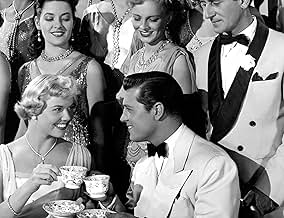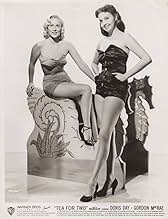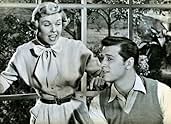Aggiungi una trama nella tua linguaA socialite with aspirations of a career in show business bets her wealthy uncle $25,000 that she can say "no" to everything for two days straight, hoping winning will help her fulfill her d... Leggi tuttoA socialite with aspirations of a career in show business bets her wealthy uncle $25,000 that she can say "no" to everything for two days straight, hoping winning will help her fulfill her dreams.A socialite with aspirations of a career in show business bets her wealthy uncle $25,000 that she can say "no" to everything for two days straight, hoping winning will help her fulfill her dreams.
- Regia
- Sceneggiatura
- Star
- Premi
- 1 vittoria in totale
- Beatrice Darcy
- (as Pat Wymore)
- Mr. Woltz - Show Backer
- (non citato nei titoli originali)
- Chorus Boy
- (non citato nei titoli originali)
- Chorus Boy
- (non citato nei titoli originali)
- Chorus Boy
- (non citato nei titoli originali)
- Friend of Lynne & Richard
- (non citato nei titoli originali)
- Truck Driver
- (non citato nei titoli originali)
- Theatre Manager
- (non citato nei titoli originali)
- Taxi Driver
- (non citato nei titoli originali)
- Lynne Smith
- (non citato nei titoli originali)
Recensioni in evidenza
Set notionally in 1929, the period of the original show, but barely even attempting historical accuracy, the film is really only a vehicle for Doris, Warners' new star. So little regard is had to period feel that Doris performs one number in a New Look dress. Soft-focus close-ups and jerky dialogue trundle the action from one musical set piece to the next.
The opening number in the rehearsal room is well-presented, with an attractive New York cityscape beyond the window and a nice 'infinite regression' effect in the wall mirrors. Doris sings and dances appealingly throughout, especially in "Crazy Rhythm" (in which Gene Nelson has a terrific athletic dance solo).
Gordon MacRae as Tommy gives us his usual thoroughly dependable (if uninspiring) male lead, and Patrice Wymore does her customary 'beautiful bad girl' as Bea Darcy. Pauline the wise-cracking secretary is played by Eve Arden (27 years later, the principal of Rydell High in "Grease"). The 'Charleston' sequence is a knockout, and Gene Nelson's bannister dance in "Oh Me, Oh My!" is astonishingly good. The character of Mabel Wylie (Virginia Gibson) is introduced, but then not persevered with, suggesting that some plot sections were later edited out.
Verdict - A pleasant Doris vehicle with songs cleverly embedded in a so-so plot.
Day proves what a fine vocalist she is--and Gordon MacRae proves he's no slouch with his pleasant baritone voice. Gene Nelson does some fancy footwork and there are comic highlights with Eve Arden tossing off one-liners with her usual skill and Billy deWolfe reminding us what a wonderful comedian he could be with the right material.
Pleasant, above average entertainment, well worthwhile if you like these kind of fluffy musicals.
Despite a few spirited dance numbers, and the energetic (if light on charisma) Gene Nelson, it feels like all the A-List musical talent was locked up over at MGM.
The reliable Eve Arden is given some C-list wisecracks, SK Sakall tries his best with his trademark adorable apoplexy, but much of the comedy unfortunately falls into the less than capable hands of Billy DeWolfe.
The score is nice but not that memorable - 'Tea for Two', 'No, No, Nanette', 'I Want To Be Happy', 'Do, Do, Do' - while the story, loosely based on the play No, No, Nanette concerns rivalries, lost investments, and a comic uncle (SZ Sakall, who played the same part in countless films throughout the 1940s and 1950s). Billy de Wolfe and Patrice Wymore round out the cast as a heel of a producer and his sniping leading lady.
As a film, 'Tea for Two' passes the time and boasts some great costumes and colour, even if most of the film doesn't have a 1929 feel. And the bookending sequences, with Sakall telling a tale to a roomful of children, doesn't quite sit with the rest of the material. But it isn't bad.
Lo sapevi?
- QuizThe first of five collaborations between Doris Day and Gordon MacRae. They would later go on to co-star in The West Point Story (1950), Vecchia America (1951), Starlift (1951) and By the Light of the Silvery Moon (1953).
- BlooperAs is customary in movies of the 1950s the hairdos are all wrong: both the men and the women wear fashions of 1950 instead of 1929.
- Citazioni
William 'Moe' Early: I made a fortune today. I sold short.
J. Maxwell Bloomhaus: Who did you sell short to?
William 'Moe' Early: You!
- Curiosità sui creditiThe writing credit card originally read: Screen Play by Harry Clork, and the smudged out credit read: Suggested by the play "No, No, Nanette," by Frank Mandel, Otto Harbach, Vincent Youmans and Emil Nyitray.
Notably missing is the name of lyricist Irving Caesar, who was a co-lyricist of the original Broadway score of "No, No, Nanette." Yet receiving credit are Frank Mandel and Emil Nyitray, who actually wrote the play "My Lady Friends," on which the libretto of "Nanette" was based.
Apparently, there was a subsequent dispute involving these credits, the details of which remain obscure, but as part of the settlement of the matter, Warners agreed to blur the source credits on all future prints of the film (which now includes video, DVD, Blu-ray and cable TV versions).
- ConnessioniFeatured in Biography: Doris Day: It's Magic (1998)
- Colonne sonoreCharleston
Lyrics by Cecil Mack
Music by James P. Johnson (as Jimmy Johnson)
Danced by Billy De Wolfe and cast
Played at the Westchester estate
I più visti
- How long is Tea for Two?Powered by Alexa
Dettagli
- Data di uscita
- Paese di origine
- Lingua
- Celebre anche come
- Tea for Two
- Luoghi delle riprese
- Azienda produttrice
- Vedi altri crediti dell’azienda su IMDbPro
- Tempo di esecuzione1 ora 38 minuti
- Proporzioni
- 1.37 : 1
Contribuisci a questa pagina
































